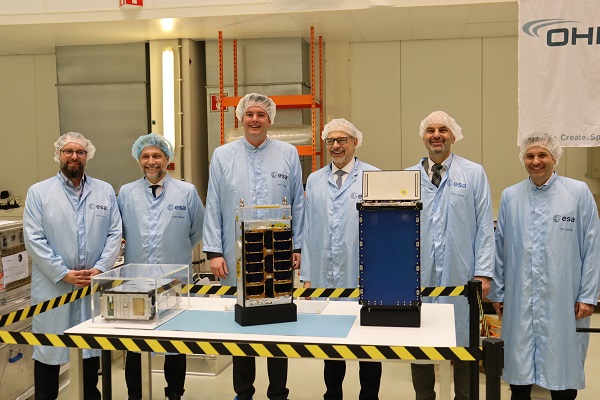 (L-R) Marc Serres, CEO of LSA; Ian Carnelli, Hera Project Manager at ESA; Lex Delles, Luxembourg Minister of the Economy, SMEs, Energy & Tourism; Josef Aschbacher, DG at ESA; Dietmar Pilz, Head of ESTEC, ESA; Mathias Link, Deputy CEO of LSA;
Credit: MECO
(L-R) Marc Serres, CEO of LSA; Ian Carnelli, Hera Project Manager at ESA; Lex Delles, Luxembourg Minister of the Economy, SMEs, Energy & Tourism; Josef Aschbacher, DG at ESA; Dietmar Pilz, Head of ESTEC, ESA; Mathias Link, Deputy CEO of LSA;
Credit: MECO
On Monday 6 May 2024, the European Space Agency (ESA) and the Luxembourg government signed an extension of their memorandum of cooperation (MoC) concerning the field of space resources for another five years.
As reported by the Luxembourg Space Agency (LSA) and Luxembourg's Ministry of the Economy, key areas of convergence include developing the space resources sector to facilitate sustainable space exploration, while fostering the creation of new markets and business opportunities, as well as using the technological innovations from this field to improve life on Earth.
The extension was signed in the context of a visit to ESA's Space Research and Technology Centre (ESTEC) in Noordwijk (Netherlands) by Luxembourg's Minister of the Economy, SMEs, Energy and Tourism, Lex Delles. ESTEC is the ESA's technical centre; it is its largest centre where about 2,500 technicians, engineers and researchers, including Luxembourgish experts, work on space technology development and spacecraft design.
LSA and the ministry added that the centre also includes extensive facilities for prelaunch testing of space crafts, which Minister Delles discovered during his visit. The Juventas nano satellite - partly developed in Luxembourg by Gomspace - is currently in testing phase to be part of the Hera mission programmed for October 2024. Hera's main objective is to help validate the kinetic impact method for deflecting a possible asteroid on a collision course with the Earth. Juventas is equipped with a radar instrument for measuring the internal structure of the asteroid.
The delegation had the opportunity to discover the Luxembourgish spacecraft during the visit, which also included a bilateral meeting with ESA Director General, Josef Achbacher, and an informal gathering with the Luxembourgish staff working in the ESA centre.
"Our collaboration with ESA is very successful and I welcome the fruitful exchange here at ESTEC. ESA is a key technical partner for Luxembourg and the projects we are running together do not only make sense for the space industry, but have real impact on the national economy and on the day to day life of people. Hera is a very good practical example of a contribution from a Luxembourgish private company to an ESA mission," said Minister Delles.
"Luxembourg's investment in space is really impressive, the country is a world leader in the field of space resources and I am delighted we could sign this MoC today. ESA and Luxembourg collaborate very well. I hope to see this collaboration going further, project wise but also by being able to welcome more Luxembourgish talents as part of our staff in the future," added ESA General Director Josef Achbacher.
Following the memorandum signed in 2019, ESA, LSA and the Luxembourg Institute of Science and Technology (LIST) signed an implementation agreement, concerning cooperation activities at the European Space Resources Innovation Centre (ESRIC). According to LSA and the ministry, the centre comes as a strategic project continuing the SpaceResources initiative launched in 2016 by the government. The domain of space resources, which has been one of the flagships of Luxembourg in its national strategy, has gained visibility on the international stage, and about twelve companies are active in this field in Luxembourg in 2024.
LSA and the ministry added that ESRIC is positioning itself as Europe's centre of excellence for science, technology and business related to space resources, providing access to experts and specialised research facilities procured by ESA. ESRIC is focused on advancing knowledge and technologies for extracting oxygen from lunar regolith, for example with its ALCHEMIST in-situ resource utilisation (ISRU) demonstrator, the first research facility delivered to the centre in 2023. Other facilities studying oxygen extraction are set to be delivered to ESRIC in the next years.
Moreover, ESRIC's Start-up Support Programme (SSP) focuses exclusively on space resources. It aims at developing early-stage ventures and startups designing novel technologies for space resources applications along the space resources value chain. Three companies have already been selected to join the programme and a fourth one is expected to be selected this summer.
ESRIC also organises the Space Resources Week in Luxembourg and collaborated with ESA to launch the first Space Resources Challenge, which encouraged the community to explore innovative technology solutions for prospecting resources on the Moon.
Moving forward, the cooperation between ESA and Luxembourg, through activities at ESRIC, will continue to prepare for future ISRU infrastructures on the Moon, paving the way for sustainable exploration beyond our planet, LSA and the ministry concluded.








